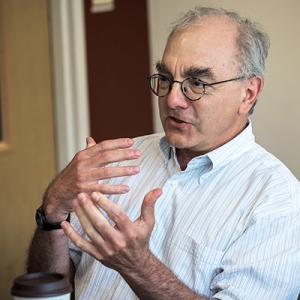2014 Sol Stetin Award for Labor History

Leon Fink
Distinguished Professor of History, University of Illinois at Chicago
Leon Fink is Distinguished Professor of History at the University of Illinois and editor of the quarterly, Labor: Studies in Working-Class History of the Americas. A graduate of North Central High School in Indianapolis (where he served as student council president a year before future governor Mitch Daniels), the University of Warwick where he spent an independent year of study under E.P. Thompson, and Harvard College ‘70, Fink’s professional training as a historian began at the University of Rochester, where he received his doctorate under Herbert Gutman’s tutelage in 1977. Though he first taught as a Lecturer in the City College of New York, 1972-1974, his scholarly career largely developed at the University of North Carolina at Chapel Hill, 1977-2000 and, since 2000, in Chicago. A specialist in labor and immigration history, he has written, co-authored, or co-edited ten books, including, most recently: Workers in Hard Times: A Long View of Economic Crises (2014); Sweatshops at Sea: Merchant Seamen in the World’s First Globalized Industry, from 1812 to the Present (Chapel Hill: UNC Press, 2011), Workers Across the Americas: The Transnational Turn in Labor History (2011); The Maya of Morganton: Work and Community in the Nuevo New South (2003) and winner of the Thomas Wolfe Literary Award of the Western North Carolina Historical Association), and Progressive Intellectuals and the Dilemmas of Democratic Commitment (1998). Along the way, Fink has enjoyed numerous academic honors including service as a Lloyd Lewis Fellow at the Newberry Library, Guggenheim Fellow, NEH Research Fellow, Charles Warren Center Fellow at Harvard University, National Humanities Center Fellow, and a Senior Fulbright Lecturer at the University of Munich. At UIC, Fink founded the PhD concentration in the History of Work, Race, and Gender in the Urban World. Fink’s current book project, The Long Gilded Age: American Capitalism and the Lessons of a New World Order, 1880-1920 is due out from the University of Pennsylvania Press by the end of 2014.
Other highlights of Fink’s career include a variety of public engagements. He has extensive involvement in public history and K-12 related history education, work that was recognized in his election as Vice President of the American Historical Association-Teaching Division, 1998-2001. Alongside colleagues and graduates in Chicago, he assumed leadership of the Chicago Labor Trail, a narrated map and accompanying website that received a best project award from the Illinois Humanities Council. Fink also takes regular delight in joining important debates on relevant public issues: his recent commentaries—on subjects ranging from an assessment of “Working America” on May Day to the attack on unionized workers in Wisconsin and Indiana—have appeared on Salon and Huffington Post and Pacifica Radio, as well as within the editorial pages of the Raleigh News and Observer and the Chicago Tribune. Moreover, as the official journal of the Labor and Working-Class History Association, Labor is determined—in print and through its website LaborOnline—to stretch across the academy, union offices, and beyond to reach an engaged, progressive public. Finally, Fink is a proud and active member of UIC-United Faculty, AFT-AAUP, a new faculty union currently struggling for its first contract.

